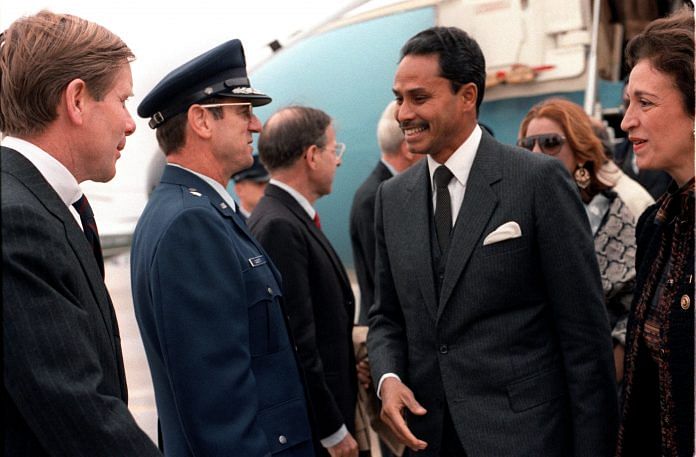New Delhi: Called in turn a military dictator, a hero and even a ‘Biswa Behaya’ (the most shameless person of the world), former Bangladesh President Hussein Muhammad Ershad leaves behind a legacy of decidedly mixed contours.
Ershad, who snatched power in Bangladesh through a bloodless coup just 11 years after its independence from Pakistan, died Sunday at the age of 89.
He had reportedly been suffering from multiple complications, including infections in his lungs and kidneys, for a long time.
External Affairs Minister S. Jaishankar led in paying tributes to the leader, who was born in West Bengal in 1930 and enjoyed a special relationship with India throughout his life.
Deeply saddened by the demise of H.E. Hussain Muhammad Ershad, former President of Bangladesh today. He will long be remembered for his contribution to the special bilateral relationship with India and for his public service to Bangladesh.
— Dr. S. Jaishankar (@DrSJaishankar) July 14, 2019
Ershad last visited India in July 2018 on a special invitation by the Modi government for being the leader of one of Bangladesh’s powerful political parties, Jatiya Party, currently serving as the country’s principal opposition outfit.
ThePrint looks back at the controversial life of Hussein Muhammad Ershad, who is accused of brutalising critics but was reportedly loved by the rural masses for bringing development to villages.
Also read: Remembering Lt Gen. Jagjit Singh Aurora, the ‘Liberator of Bangladesh’
Checkered life
Ershad became Bangladesh’s President in 1982 through a bloodless coup and ruled the country till 1990, a time that saw the country undergo massive Islamisation. Among other things, his administration is credited with decreeing Islam the official religion of Bangladesh, which was until then secular.
Regarded as the most powerful man of Bangladesh, Ershad was also accused of murder.
At the age of 48, in 1978, Ershad was promoted as army chief by Bangladesh’s then president Zia ur Rahman. In 1981, he is alleged to have murdered Major General M.A. Manzur, who initiated a coup against Rahman. The Bangladesh National Party (BNP), which is now led by Rahman’s widow and former prime minister Khaleda Zia, alleges that Ershad was also responsible for the assassination of Rahman, who died during the coup.
The trial for Manzur’s murder is still underway.
A Jatiya Party lawmaker Nasim Osman later claimed that Ershad had killed Rahman since he masterminded the killing of Bangladesh’s founding father Sheikh Mujibur Rahman in 1975.
During his rule as president of Bangladesh, Ershad suspended the constitution, disbanded parliament, and is said to have harassed and tortured his political opponents. Ershad was also charged with massive corruption and embezzlement, but cleared of the accusations.
On a visit to the US in October 1983, he was hailed for upholding democratic rights in the country while building newer avenues of economic growth, by the then US President Ronald Reagan.
Former Intelligence Bureau joint director M.K. Dhar wrote in his book: ISI-CIA Al Qaeda Nexus that, as president, Ershad created a ‘Presidential Security Force’ that was entrusted with the primary task of ensuring his and his family’s physical security.
Dhar’s book also dwelt on the rise of radical Islam in Bangladesh, first under Rahman, and then Ershad.
According to experts, militant outfits such as the Jamaat-e-Islami, which is said to be backed by Pakistan’s ISI, started resurfacing immediately after Mujibur’s death.
Journalist Hiranmay Karlekar wrote in his book, ‘Bangladesh – The Next Afghanistan?’, that the Jamaat and its affiliates were flush with funds from Pakistan and Saudi Arabia by the time Ershad resigned as president in December 1990.
During the 2014 elections in Bangladesh, the Jatiya Party emerged as the principal opposition party amid a BNP boycott. In 2015, Ershad was also made special envoy to Prime Minister Sheikh Hasina with the rank and status of a cabinet minister.
Also read: The liberation of Bangladesh — the Indian armed forces’ finest hour



